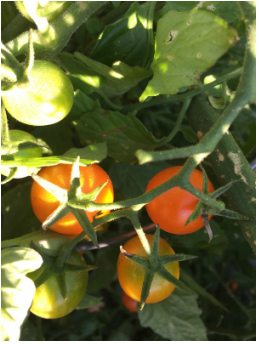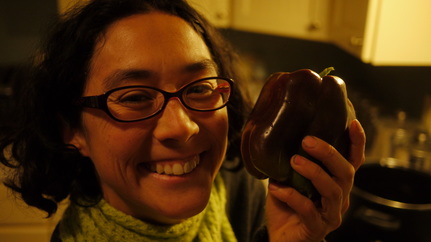
When I was at a coffee shop this past fall, I ran into a workshop participant and asked her if she had had success this past growing season. Along with admitting that she had been too busy to have a garden, she was also willing to share the fact that she had been a little intimidated when it came to getting started. She brilliantly coined the term, ‘daunted gardener’ and I thought it was such a fitting way to characterize the feelings of a beginner venturing down the growing path.
As someone trying to encourage more people to grow their own food, that conversation reminded me that my task is to not only give people good information about how to garden but to find ways to break through that fear of being a novice.
Now if you’re the type of person that dives right into new endeavors without a moment of hesitation, then I fully support you and this blog post might not be that useful. But I have a feeling that the struggles of that workshop participant are not hers alone.
I have been there, trust me. Paralyzed by perfection, uncertain about my skills, and terrified of failing, it was a few years before I felt like I had enough knowledge to start a garden of my own. It took volunteering on organic farms, taking workshops, and reading books before I even felt able to begin. Couple that doubt with a busy life and a short growing season and I get it…as much as you would like to have a beautiful garden where you pluck succulent tomatoes off the vine, or graze for luscious peas as you move effortlessly through your weed-free garden, when it comes down to it, it’s far easier, more convenient, and way less time-consuming just to buy vegetables at the grocery store.
Yet, like any new interest, if you lock onto something that intrigues or challenges you, it isn’t long before the act of resisting it is more damaging to the ego than the act of just beginning.
That inevitable day came for me several years ago when I tentatively bought some tomato and broccoli seeds at the nursery. Borrowing the fluorescent light fixtures from the garage and buying a few sunshine bulbs for them, I rigged up a seed starting system in the living room of our small two bedroom rental. I punctured some holes in recycled salsa containers, filled them with seed starting mix and, probably for the tenth time, reviewed my notes, read the seed packets, carefully planted those seeds in soil, and sprayed them with water.
I diligently cared for them every day, absolutely certain of my imminent failure.
To my surprise, most of the seeds germinated and then, after further review of my notes, I transferred them to bigger pots. Lo and behold, they grew into seedlings like the ones that I would see in the nurseries. Did that success infuse me with confidence so that I fearlessly planted my entire garden and basked in the glory of my yields?
Of course not.
At every turning point during that first growing season, I was wrought with uncertainty and self-doubt, second-guessing my decisions, my planting scheme, and the vegetables that I had chosen to grow. I would be lying if some of those same feelings don’t come up for me still, when I’m trying new seed varieties or new techniques. The feelings are just more muted by the years of experience that have convinced me of a couple truths:
First, seeds want to sprout, plants want to grow, and life wants to prevail despite our belief that we will perpetually fail, and second, we will fail, and that’s completely normal, if not expected.
So, for the daunted gardeners out there, here is some advice to get you started. I’m not going to share the nuts and bolts of gardening with you. For that sort of information, you can take my Starter Garden Workshop, or go to my other videos. Rather, this is the advice to break through the mental blocks that keep you from beginning in the first place.

Intentionally carve out space in your life for gardening. Like anything meaningful in life, gardening takes commitment and dedication. I am not going to be the person that tells you that vegetable gardening can be done in 15 minutes/week. Nor am I saying that it is going to take you two hours/day. Instead, if it’s important enough, I’m going to ask you to shift something in your life to allow yourself the time to garden. The payback, I feel, far outweighs any sort of sacrifice you think you are making. Remember that your schedule will never magically open up. If you don’t plan for it, it will likely not happen.

Garden failures happen all the time. Whether it’s limited germination of carrots, winter squash devoured by voles, or limited fruiting because of shade or lack of fertility, I have finally learned to take these failures in stride, note them for next year, and look forward to trying again.

At every step throughout the growing season, recognize your successes. We are so quick to point out what is going wrong in our gardens (and in our lives) rather than being grateful for what is working. I may not have had a good carrot crop this past season but I had a great tomato harvest. It meant that I traded some of my tomatoes for a friend of mine’s carrots. Problem solved, connection made, and delicious vegetables shared.

With yourself and with your garden. Allow yourself at least three seasons (or more!) to feel like you know what you are doing. We have a challenging growing climate. If it’s not the short growing season then it’s the hail, or the late frost, or poor soil, or the cold nighttime temperatures. Giving yourself only one year to ‘figure it all out’ is not realistic. Think about it, if you’ve been gardening for 20 years, it means you’ve only grown tomatoes 20 times. If someone is perfecting a song on the guitar, they’ve likely played it hundreds of times. As gardeners, we are limited by the natural cycles and the seasons. That is the beauty and the challenge of gardening.

Whether it’s a couple pots with tomatoes or a 4’ x 8’ raised garden bed, just planting some seeds or seedlings in the ground and seeing them grow will take the mystery out of the process. As your skills grow, so can your garden.

Your garden will be your best teacher on so many levels. Undoubtedly, it will teach you how to grow food and be more self-reliant. It will instill you with more respect and appreciation for your food, for the soil, and for the hard work that goes into putting nutritious meals on the table.
It will also teach you more intangible lessons like patience, understanding natural cycles, and the benefit of observation. Then, hopefully, over time, it will cut through your fear of failure, and encourage you to try again. Your garden will let you know that the natural world is forgiving of our mistakes, the challenge is more with us being forgiving of ourselves.
The reality is that what I do every year is not complicated. And even if it isn’t ‘perfect’, it still becomes a beautiful and riotous mess of greenery, attracting beneficial insects, creating habitat, and building fertility. A garden will challenge you in good and often surprising ways and when you have success, it will be sweet, meaningful, and nourishing.

